Sugar Detox: What to Do When You’ve Had Too Much Sugar

- Need a sugar detox? Junk food binges happen. Luckily, there are a few things you can do to help your body recover faster.
- The symptoms of eating too much sugar include fatigue, cravings, low blood sugar, irritability, mood swings and headaches.
- The right dietary supplements, habits, foods and mental state can help you bounce back faster after you go off the rails. Read on for the details.
Need to detox from sugar? Sugar binges happen to the best of us. Birthdays, holidays, Halloween … heck, even just a stressful day can throw you off your clean-eating game into a spiral of candy and other foods to satisfy your sweet tooth. We’re all human, so learning how to sugar detox can help when you make the decision to enjoy some sweet or starchy treats.
When you do decide to binge on sugar and carbs, use this sugar detox guide to make it easier on your body. These steps will help you recover faster and get rid of cravings, so you can get back to feeling on top of your game as soon as possible.
Why do we care about detoxing from sugar?
The American diet is notorious for being high in sugar consumption, equal to an average of over 1 pound per week[1]. That high sugar intake has been associated with heart disease and obesity.
Even if you aren’t following that 1-pound-a-week sugar consumption diet, there are other ways you can affect your body with more sugar than intended. Some diets even advocate weekly cheat days to make it easier for you to stick to the diet. The idea is that you can stick it out and eat clean six days a week, and then go crazy on day seven.
Here’s why that’s a bad idea: Your body takes a few days to recover from eating too much sugar, and by the time it’s back to full power, it’s nearly time for you to cheat again.
Your brain function could dip as your blood sugar levels crash, and you could have background inflammation for most of the week. You may lose weight, but you’ll never end up feeling like an energetic and clear-headed person who’s totally on top of their game.
That said, total restriction isn’t the answer either—and when a sugar binge happens, planned or unplanned, you shouldn’t feel bad about it. Delicious food is one of the great pleasures in life. Plus, letting loose now and then reminds you how bad excess sugar can make you feel, and strengthen your commitment to a more healthful diet.
The sugar hangover: What happens when you eat too much sugar
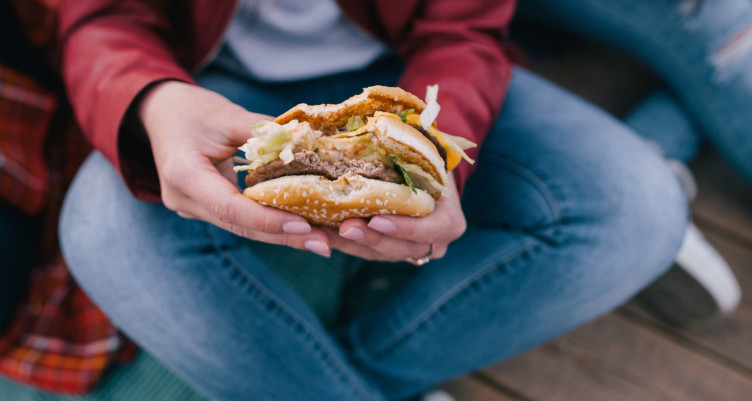
When you go crazy with sugar or carbohydrates, you’re going to face some repercussions during the week that follows. That lousy feeling is the culmination of your body’s systems directly responding to your sugar overload, from the blood sugar spike and drop, to the dehydration that can follow indulging your sugar cravings.
If you pay close attention, you can identify the systems in your body that are struggling—and then take action to help those systems recover.
The short-term consequences of eating too much sugar or carbs can result in side effects such as:
Temporary weight gain
If you’ve ever looked in the mirror after a heavy carb day, you already know about this symptom. You’ll put on a few pounds and look puffier than usual.
Don’t panic. The extra weight is mostly water (more on that in a second). It’ll come off when you cut back on the added sugar and return to your normal diet.
Fatigue
In a small study of lean, healthy young men, refined carbs like sugar were shown to cause systemic inflammation.[2] This taxes your energy production in two ways. First, rodent studies have shown that sugar impairs mitochondria, reducing the amount of energy cells can produce. [3] Second, your cells have to spend a lot of their energy dealing with the stress of low-grade inflammation—the result of too much sugar.
Also, in a study of 74 men, sugar was found to cause a sharp decline in testosterone. This drains your energy levels quickly, leaving you feeling lethargic or as if you have brain fog.[4] Be ready to weather a couple days of feeling tired. The fatigue will pass once your body repairs itself and you get back to eating better.
Related: This Is Your Brain on Sugar (Trust Us, It’s Not Pretty)
Mood swings and headaches
Sugar destabilizes your blood glucose levels and causes withdrawal, leaving you with symptoms like intense cravings and low energy. A lot of people get headaches, migraines and mood swings during the sugar detox period, too.
In addition, a sugar cleanse could lead to headaches if you aren’t staying adequately hydrated. Because hunger signals are stronger than thirst signals, it’s easy to reach for something to eat rather than a glass of water. However, if you want to learn how to detox from sugar properly, hydration is a critical step.
Cravings
Sugar lights up your brain’s reward centers like a Christmas tree, which feels great—until the next day when the sugar runs out and withdrawal settles in.[5]
Sugar hits all the same brain regions that addictive drugs do, and while it’s melodramatic to compare sugar addiction to cigarettes or cocaine, you’ll still have to deal with pretty heavy cravings while your body gets itself back into balance.
Additional mental symptoms
What happens to your brain when you cut out sugar after going overboard? Other common symptoms include:
Poor sleep: You may have trouble falling or staying asleep during a sugar detox. Consuming sugar has a negative impact on your gut health, which affects your ability to get quality rest. And if nights of poor sleep start to pile up, you won’t be setting your body or brain up for success.
Cognitive issues: The effects of sugar on your brain are wide-ranging, with one decade-long study showing that people with high blood sugar had significantly faster rates of cognitive decline.[6]
Read further for a couple of tips to help ease your sugar habit.
How to prevent sugar crash symptoms

These tips are meant to help you bounce back from the symptoms of a sugar binge. You might find 7-day sugar detox programs online, but any dietitian worth their salt (or sugar) will tell you that you shouldn’t restrict or punish yourself for eating too many grams of sugar. It happens. The best solution is to take a sustainable approach to nutrition and return to your normal style of eating.
- Drink extra water during your binge: When you eat too much sugar, you pack several hundred grams of it into storage as glycogen. Your body stores at least three grams of water for every gram of glucose you store, which means you’re storing a bunch of extra water with your carbs.[7] This explains the water weight you put on after eating lots of carbs. You want to drink more water than usual during your cheat day, otherwise you’ll get dehydrated, which can lead to headaches and fatigue.
- Add electrolytes: Bonus points if you add salt and potassium to your water in the week after you binge on carbs. When you return to a low-carb diet, your body will burn through your carb stores and release all the water it took on, and you’ll lose a lot of sodium and potassium with it. Make up for it with an electrolyte-rich supplement to decrease dehydration-related headaches and fatigue.
- Don’t skip meals: It can be tempting to fast the day after a sugar binge. Maybe you want to balance out the extra calories or give your system a chance to get back to baseline. Fasting is good for you for about a dozen different reasons—but on days after you’ve eaten too much sugar, you’re better off eating lots of quality whole foods instead of fasting.
- Stabilize your blood sugar: Sugar throws your blood glucose levels out of whack, resulting in withdrawal symptoms like intense cravings and low energy. This can cause headaches, migraines and mood swings, too.
- Eat low-carb whole foods that will help stabilize your blood sugar so you don’t feel awful and end up falling into a second sugar binge. Focus on plenty of vegetables and healthy proteins like grass-fed beef and eggs from pasture-raised chickens. Even whole grains such as quinoa or the natural sugars in fruit can help you stabilize if your macros allow them.
- Eat an anti-inflammatory diet: Your cells may be dealing with minor inflammation after you overindulge in sugar, and you want to give them the building blocks to repair themselves afterward. Read on for the foods you should eat to manage inflammation.
- Eat at regular intervals: If you’re tempted to fast because you feel guilty about eating lots of sugar the day before, you can fall into disordered eating patterns where you binge, fast and then binge again. That’s not a cycle you want to go down. Listen to your body and eat when hungry, and stop eating before you’re full.
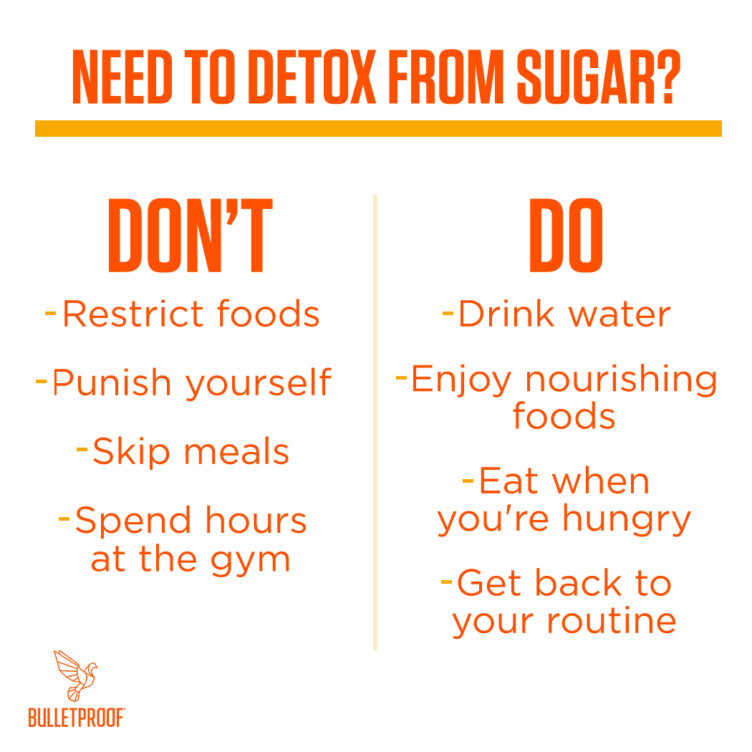
Sugar detox diet: What to eat after a sugar binge
You can eat your way back to balance after a carb binge. Here’s some inspiration for your sugar detox diet meal plan:
Quality, healthy fats and proteins
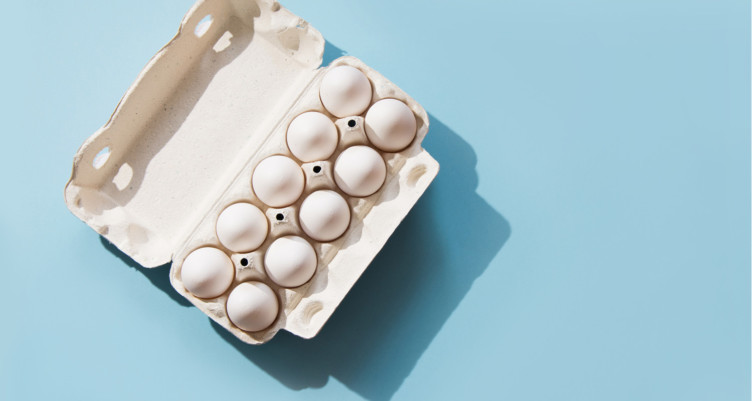
Eat foods like: Grass-fed meat, wild-caught salmon, pasture-raised eggs and coconut oil.
These will fill you up and decrease cravings. High-protein, high-fat foods nourish your body and give it what it needs to get back on track after a sugary detour. Focus on eating as normally as possible, and listen to your body to figure out the best combination for you.
Pro tip: For sustained energy and brain power, add a quality fat like Bulletproof Brain Octane C8 MCT Oil to coffee and smoothies.
Fiber
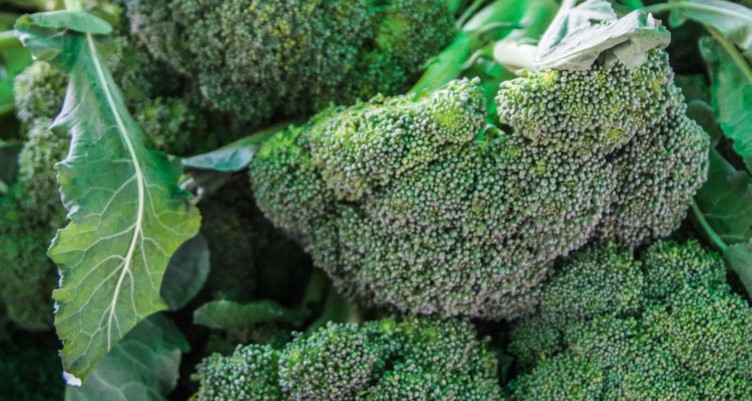
Eat foods like: Asparagus, broccoli, carrots, cucumber, celery, leafy greens and sweet potatoes.
To build stable energy and decrease cravings, eat fiber to regulate your blood sugar.[8] Fiber also feeds beneficial gut bacteria that may have been hurt by sugar. Hit your daily fiber intake by eating your vegetables.
Antioxidants
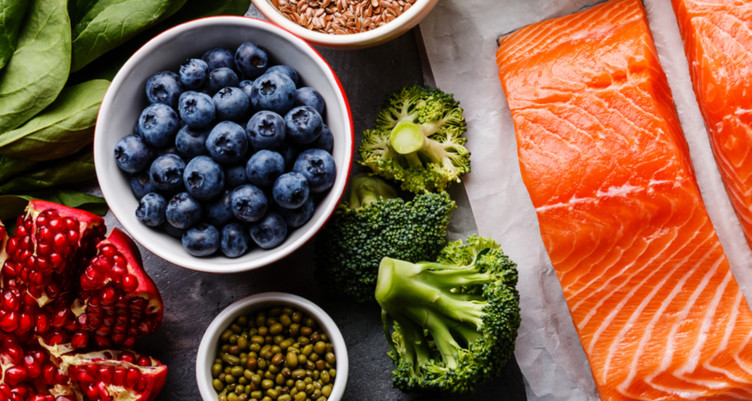
Eat foods like: Colorful fresh fruits and veggies like red cabbage, Swiss chard, blackberries and raspberries. Drink coffee and green tea for an extra dose of antioxidants, too.
Antioxidant-rich foods will help your body deal with systemic inflammation and repair itself.
Anti-inflammatory foods
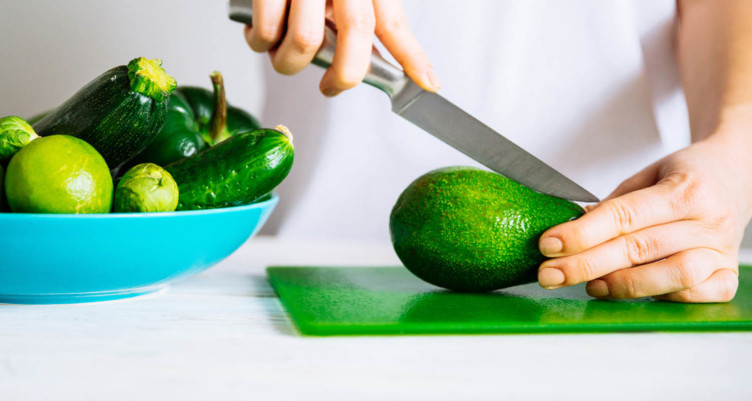
Eat foods like: Wild-caught salmon, broccoli, avocados and green tea.
To help your body recover from the inflammation caused by a carb and sugar overload, stick to foods that are considered easy for your body to process with minimal potential for inflammation.
Related: Superfoods That Destroy Inflammation in Your Brain
Foods that curb sugar cravings
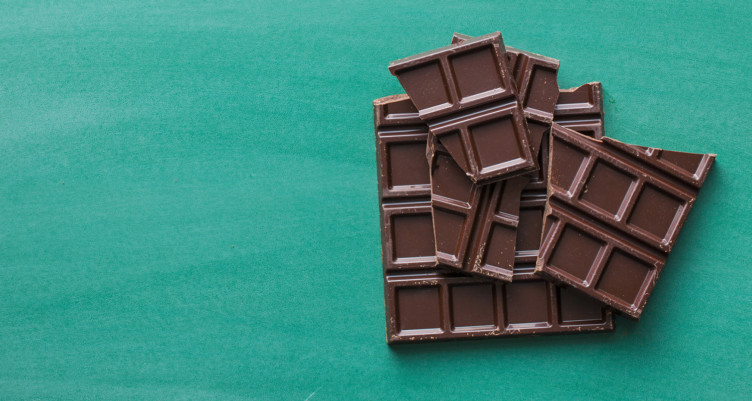
Sugar lights up addictive reward pathways in your brain and will inevitably cause withdrawal and cravings in the days following a binge. Imagine it’s like giving up anything cold turkey: it’s never easy to tell your body no when it wants something.
Clear your pantry of high-carb snacks to reduce temptation. Instead, stock your kitchen with quality snacks to nip those cravings in the bud before they seduce you into another sugar binge.
Sugar cravings come on fast and sap your energy, so high-fat snacks that you can eat immediately can save the day. A few options are:
- Dark chocolate (78% or darker)
- Grass-fed hot dogs
- Pastured salami or pepperoni
- Guacamole
- Grass-fed meat sticks, jerky or bars
- High-fat nuts like macadamias or almonds, preferably raw
- Quality sugar-free nut butter spread over veggies or fruit
Check out this list of 16 keto-friendly snacks to curb cravings. For a quick snack that fuels like a protein bar but tastes like a cookie, stock up on Bulletproof Collagen Protein Bars.
Why exercise helps speed up your sugar detox

Even if you feel bloated and miserable, do some kind of exercise after eating too much sugar. Hit the gym, do some high-intensity interval training or just go for a long walk.
Exercise stabilizes your blood sugar and helps you burn through glycogen stores faster, and psychologically, it helps you get back to your high-performance routine after you break it. It can be tough to exercise during or on the heels of a high-sugar day, but you’ll feel much better afterward.
Focusing on wellness after a sugar detox
Above all else, remember that diet exists on a spectrum. You don’t have to eat perfectly all the time. The occasional sugar binge is worth it sometimes.
If you feel like you’re hitting the ice cream and processed foods more often than usual, it’s never a bad idea to take a step back and consider your nutrition. Speak with your doctor or a nutritionist about how you can mitigate the triggers that could be causing you to eat more sugary treats than you’d like.
It could be anything from sugar-free foods with artificial sweeteners causing you to crave “sweet,” to stress you’re trying to treat with food. Whatever could be driving your sugar cravings, it’s always a good idea to explore, define and understand.
Accept that you won’t feel your best for a few days afterward and enjoy yourself. And when you do go wild with sugary, carb-packed, starchy food, keep this sugar detox plan handy. It’ll help you get back on your feet and feeling your normal energy levels as quickly as possible.
As for what you should do moving forward? Put your wellness first by:
Getting proper sleep
Now that you know more about how to flush sugar out of your system, you should prioritize getting enough quality sleep. Research shows that sleep deprivation affects appetite-regulating hormones, which could lead to cravings for sugary, highly palatable foods.[9]
You can put yourself in the best position to get a good night’s rest by taking the right supplements, avoiding blue night at light and implementing other beneficial sleep hygiene habits.
Staying motivated
This sugar detox for beginners guide is a tool you can use to get back on track. But like any endeavor, it takes patience and persistence to make your health and wellness goals come to fruition.
On days where you may have a sugar, think about the long-term implications of a short-term indulgence. Some days will be more difficult than others, but keep your motivations in mind, stock up on nutritious foods and do your best to limit your sugar consumption.
The bottom line: If you go overboard on sugar, there are ways to get your body and brain back on track. Making dietary and lifestyle changes can have a major impact on the success of your sugar cleanse. And even if you aren’t completely dialed in with your diet at all times, consistently making smart choices and staying motivated will pay off in the long run.
Want to satisfy your sweet tooth without consuming sugar? Find out which Bulletproof-friendly alternative sweeteners work best.
Sign up for early access to sales, product launches, the latest Bulletproof news and more!



